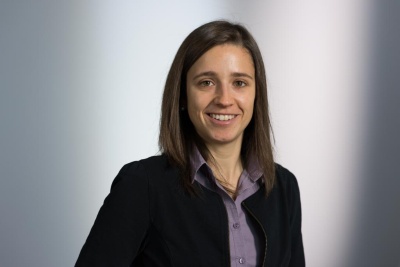Mireia Roca Riu
What do you find fascinating/challenging about energy research and the energy transition?
The field has multiple perspectives and it is relevant for many areas of research. Therefore, it requires a multi-disciplinary approach and the joint work of different specialists to bring theory to practice. I find that fascinating, since it is not only about being very good at your specialty, but also understanding other methods and finding a common way to understand each other and work together. This transdisciplinary work also makes the field very challenging. Specialists from different fields use their own terminology making communication complex and it is not straightforward to find a compromise among different priorities.
What are your research topics and what is your role within the SCCER Mobility?
My research topics focus on optimization of urban logistics, in particular the improvement of efficiency for the delivery of goods within urban environments. Within SCCER Mobility, I am involved in the Digitalization Action Plan. My role is to coordinate the research done within SCCER Mobility on the topic of digitalization. For that reason, I keep in contact with the involved research partners as well as organize events to enhance communication and find synergies among the different projects. Moreover, based on a predefined framework, the idea is to homogenize the results from the different digitalization projects to strengthen the results within the SCCER Mobility contributions.
Why did you become a scientist?
I found out that doing research is the most exciting way to keep solving new problems throughout your career. I feared getting a job that would get monotonous and repetitive and not involve a certain degree of creativity. I think that becoming a scientist prevents that and it keeps me in contact with interesting new problems. At the same time, the problems always keep a social or environmental component, rather than only focusing on economic benefits.
What are your main career highlights?
It is difficult to consider some of my career steps as highlights, except for the achievement of earning a PhD. I find multiple professional experiences relevant to define my career; however, I would not consider them highlights. Additionally, other activities, were part of my training and defined my career, for instance, working on applied research projects with EU and National Funds was very enriching. Afterwards, in the postdoc position at the Institute for Transport Planning and Systems at ETH Zurich, I expanded my field of knowledge and at the same time continued gaining more research experience. Now, in my new role at SCCER Mobility, my tasks are significantly different, but also complement my career building other necessary skills and definitely enlarging the list of topics that I have worked on within the area of mobility.
How do you think mobility will change in the next 10 years and what role will renewable energy play?
I usually refrain from making predictions, as I believe it is very difficult to foresee the big picture, too many factors are involved, which definitely fall outside my field of expertise. Nevertheless, I am convinced that autonomous, electric and shared mobility will have an important role in 10 years from now. Autonomous vehicles may not be fully deployed, but they will be gaining market share, in at least some sectors. Electric alternatives will be more and more available for private owners as well as corresponding recharging stations.
What is your "work-life-balance" recipe?
I believe it is important that everyone makes a conscious decision on how their optimal balance looks like and afterwards adhere to this decision on how to organize their personal/professional life. I decide and try to stick to this at the beginning of each year, while also allowing some flexibility, especially when there are project or conference deadlines, where it is normal to work more than usual. Except for these periods, I do my best to be efficient during my work time and close my mind to work when I am outside of the office.
Can you provide recommendations for young scientists wishing to pursue a career in the field of (energy) research?
I would recommend them to create a good balance between very research-oriented work and developing other necessary skills or growing knowledge in a broader context. Similarly, to the work-life balance, there is another balance. On one hand, we as scientists need to produce innovative research contributions to publish in journals/conferences and make an impact. On the other hand, we must not forget how to present an idea, describe it in a clear and structured way, or find the channels to make this work arrive at the relevant community. For that reason, it is important to be up to date in related research fields and participate in events to keep in touch with a broader field.
Text and picture: Mireia Roca Riu, August 2020
!!! This document is stored in the ETH Web archive and is no longer maintained !!!
